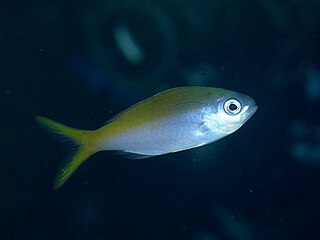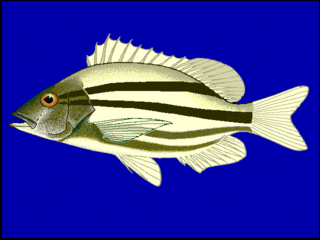
Macolor is a genus of marine ray-finned fish, snappers belonging to the family Lutjanidae. They are native to the Indian Ocean and the western Pacific Ocean.

The black and white snapper, the black and white seaperch or black snapper, is a species of marine ray-finned fish, a snapper belonging to the family Lutjanidae. It is native to the Indian Ocean and the western Pacific Ocean.

The vermilion snapper, the clubhead snapper, night snapper or beeliner is a species of marine ray-finned fish, a snapper belonging to the family Lutjanidae. It is native to the western Atlantic Ocean.

Caesionidae, the fusiliers, are a family of marine ray-finned fishes in the order Perciformes. The family includes about 23 species. They are related to the snappers, but adapted for feeding on plankton, rather than on larger prey. They are found at reefs in the Indo-Pacific and in the Red Sea.

Lutjanus is a genus of marine ray-finned fish, snappers belonging to the family Lutjanidae. They are found in the Atlantic, Indian, and Pacific Oceans. They are predatory fish usually found in tropical and subtropical reefs, and mangrove forests. This genus also includes two species that only occur in fresh and brackish waters.

The sailfin snapper, blue-lined sea bream or blue-lined sea perch is a species of marine ray-finned fish, a snapper belonging to the family Lutjanidae. It is native to the Indo-Pacific region. The sailfin snapper is targeted in mixed-species fisheries throughout its range. In areas such as the Philippines it is known to be overfished, while in others, for example Palau, pressure is lighter. It is caught predominantly using handlines and bottom trawling. The juveniles appear in the aquarium trade. It is currently the only known member of its genus.

Lutjanus agennes, the African red snapper, Guinean snapper or African cubera snapper, is a species of marine ray-finned fish belonging to the family Lutjanidae, the snappers. It is native to the coastal Atlantic waters of Africa.

Apsilus is a small genus of marine ray-finned fish, snappers belonging to the family Lutjanidae. The two species within the genus are native to the Atlantic Ocean,

Etelis is a genus of marine ray-finned fish belonging to the family Lutjanidae, the snappers. They are mostly native to the Indian and Pacific oceans with one species (E. oculatus) native to the western Atlantic Ocean.
The scalemouth jobfish, also known as the scalemouth snapper, is a species of marine ray-finned fish, a snapper belonging to the family Lutjanidae. It is native to the Pacific Ocean. This species is the only known member of its genus.

Pristipomoides is a genus of marine ray-finned fish belonging to the family Lutjanidae, the snappers. They are found in the Atlantic, Indian and Pacific oceans.

The Chinamanfish, Chinaman snapper, galloper or thread-finned sea perch, is species of marine ray-finned fish, a snapper belonging to the family Lutjanidae. It is found in the Western Pacific Ocean.
Pristipomoides typus, also known as the sharptooth jobfish, white snapper, white jobfish, goldband snapper or threadfin snapper, is a species of ray-finned fish, a snapper belonging to the family Lutjanidae. It is found in the Indian and Pacific Oceans.

Pristipomoides sieboldii, the lavender jobfish, lavender snapper or von Siebold’s snapper, is a species of ray-finned fish, which is a snapper belonging to the family Lutjanidae. It is found in the Indian and Pacific Oceans.

Paracaesio xanthura, the yellowtail blue snapper, the false fusilier, gold-backed fusilier, Pedley's fusilier or Southern fusilier, is a species of marine ray-finned fish, a snapper belonging to the family Lutjanidae. It is native to the Indo-Pacific region.

Lutjanus russellii, Russell's snapper, Moses snapper, fingermark bream, Moses seaperch or Russell's sea-perch, is a species of marine ray-finned fish, a snapper belonging to the family Lutjanidae. It is native to the western Pacific Ocean.

Lutjanus endecacanthus, the Guinea snapper, is a species of marine ray-finned fish, a snapper belonging to the family Lutjanidae. It is found on the west coast of Africa in the eastern Atlantic Ocean.

The pygmy snapper is a species of ray-finned fish, a snapper belonging to the family Lutjanidae. It is found in the western Pacific Ocean and is only known from fresh and brackish waters.

Pinjalo pinjalo, the pinjalo, is a species of marine ray-finned fish, a snapper belonging to the family Lutjanidae. It is found in the Indian and Western Pacific Oceans.
Pinjalo lewisi, the slender pinjalo or red pinjalo, is a species of marine ray-finned fish, a snapper belonging to the family Lutjanidae. It is found in the Indian and Western Pacific Oceans.
















